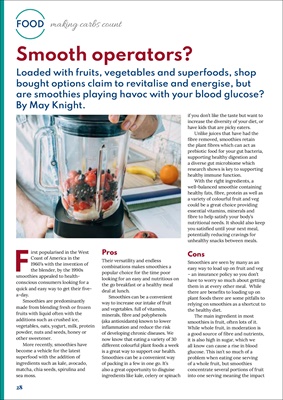
28
FOOD making carbs count
Smooth operators?
Loaded with fruits, vegetables and superfoods, shop
bought options claim to revitalise and energise, but
are smoothies playing havoc with your blood glucose?
By May Knight.
First popularised in the West
Coast of America in the
1960's with the invention of
the blender, by the 1990s
smoothies appealed to healthconscious
consumers looking for a
quick and easy way to get their fivea-day.
Smoothies are predominantly
made from blending fresh or frozen
fruits with liquid often with the
additions such as crushed ice,
vegetables, oats, yogurt, milk, protein
powder, nuts and seeds, honey or
other sweetener.
More recently, smoothies have
become a vehicle for the latest
superfood with the addition of
ingredients such as kale, avocado,
matcha, chia seeds, spirulina and
sea moss.
Pros
Their versatility and endless
combinations makes smoothies a
popular choice for the time poor
looking for an easy and nutritious on
the go breakfast or a healthy meal
deal at lunch.
Smoothies can be a convenient
way to increase our intake of fruit
and vegetables. full of vitamins,
minerals, fibre and polyphenols
(aka antioxidants) known to lower
inflammation and reduce the risk
of developing chronic diseases. We
now know that eating a variety of 30
different colourful plant foods a week
is a great way to support our health.
Smoothies can be a convenient way
of packing in a few in one go. It's
also a great opportunity to disguise
ingredients like kale, celery or spinach
if you don't like the taste but want to
increase the diversity of your diet, or
have kids that are picky eaters.
Unlike juices that have had the
fibre removed, smoothies retain
the plant fibres which can act as
prebiotic food for your gut bacteria,
supporting healthy digestion and
a diverse gut microbiome which
research shows is key to supporting
healthy immune function.
With the right ingredients, a
well-balanced smoothie containing
healthy fats, fibre, protein as well as
a variety of colourful fruit and veg
could be a great choice providing
essential vitamins, minerals and
fibre to help satisfy your body's
nutritional needs. It should also keep
you satisfied until your next meal,
potentially reducing cravings for
unhealthy snacks between meals.
Cons
Smoothies are seen by many as an
easy way to load up on fruit and veg
- an insurance policy so you don't
have to worry so much about getting
them in at every other meal. While
there are benefits to loading up on
plant foods there are some pitfalls to
relying on smoothies as a shortcut to
the healthy diet.
The main ingredient in most
smoothies is fruit, often lots of it.
While whole fruit, in moderation is
a good source of fibre and nutrients,
it is also high in sugar, which we
all know can cause a rise in blood
glucose. This isn't so much of a
problem when eating one serving
of a whole fruit, but smoothies
concentrate several portions of fruit
into one serving meaning the impact